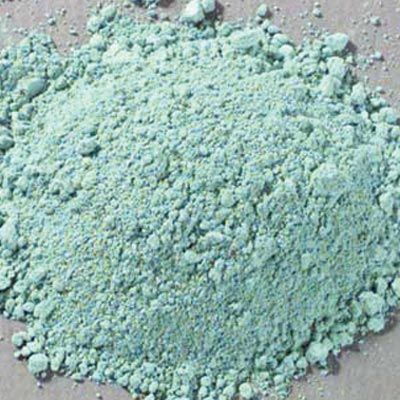Malachite Pigment
Malachite is the oldest known green pigment. The basic copper carbonate mineral described as bright bluish green or sometimes as pale green is from natural deposits of copper ore. Learn more.
Malachite Pigment
Malachite, the mineral, is a basic carbonate of copper, usually described as a bright greenish blue or sometimes as a pale green. Our malachite is obtained from mines in Nizhniy Tagil, Ural Mountains, Russia, and Hubei Province, China.
| Pigment Names | |||||||
| Common Names: | English: malachite French: malachite German: Malachit Italian: malachito Spanish: malaquita | ||||||
| Synonyms: | English: chrysocolla, green verditer, green bice, Hungarian green, mineral green, mountain green French: vert de montagne German: Berggruen, Malachitgruen Italian: verde minerale | ||||||
| Alternate Names: | It is also known as copper green, green bice, and green verditer, although these names are usually given to artificial pigment. | ||||||
| Nomenclature: |
| ||||||
Origin and History
It is a historical pigment found in Egyptian tomb paintings as early as the Fourth Dynasty (sixth century B.C.). It received sparse mention in medieval literature probably because it is more commonly found in egg tempera paintings than European oil easel paintings and is often associated with the mineral azurite.
Source
Malachite is basic copper carbonate found in many parts of the world in the upper oxidized portions of copper ore deposits. Notable occurrences include many classic mineral localities such as Shaba, Congo; Tsumeb, Nambia; Ural Mountains, Russia; Mexico; several sites in Australia; England; and several localities in the southwestern United States, especially Arizona, USA. Malachite is a secondary mineral of copper, which means it is formed when copper minerals are altered by other chemicals. It occurs when carbonated water interacts with copper minerals or when a solution of copper interacts with limestone.
Grades
Available from Natural Pigments in two grades or fineness of grind: fine and medium, which produce corresponding light and dark tones of green when used in aqueous medium. This malachite is a fine grade with an average particle size of 20 µ that exhibits a light green masstone with a slightly yellowish undertone. Medium-grade malachite has a particle size range between 60 and 100 microns.
Permanence and Compatibility
Malachite has often proved to be permanent in oil paintings, although it may acquire a dull, brownish hue owing to the darkening of the oil. It is unaffected by exposure to light. In theory, copper carbonate is blackened by sulfur compounds so that it may be affected by exposure to hydrogen sulfide found in polluted air. It is said to be incompatible with sulfide pigments, such as cadmium yellow, orpiment, realgar ultramarine, and vermilion. Even though theoretically subject to blackening when mixed with sulfide pigments, this has never been reported in practice. In tempera paintings, according to A. H. Church [Chemistry of Paints and Painting, p. 200], it is found to have stood well. Malachite passages on Italian frescoes are often still bright green.
Oil Absorption and Grinding
No data has been published on the oil absorption properties of malachite. To be useful as a bright green, it must be ground relatively coarse because, if too finely ground, it becomes too pale for practical use. Cennino Cennini remarks, “if you were to grind it too much, it would come out a dingy and ashy color.” He recommends grinding it in water: “when you have got it worked up, put it into the dish; put some clear water over the color, and stir the water up well with the color. Then let it stand for the space of one hour, or two or three; and pour off the water; and the green will be more beautiful. And wash it this way two or three times, and it will be still more beautiful.” Being moderately low in refractive index, it may be more useful in an aqueous medium like tempera than in an oil medium. However, beautiful results have been achieved with this pigment in oil.
Toxicity
Malachite is moderately toxic, and care should be taken in handling the dry powder pigment to avoid inhaling the dust.

Pigment: Malachite, Fine Grade
| Pigment Information | |
| Color: | Blue-Green |
| Colour Index: | Pigment Green 39 (77492) |
| Chemical Name: | Copper Carbonate Hydroxide |
| Chemical Formula: | Cu2(CO3)(OH)2 |
| ASTM Lightfastness Rating | |
| Acrylic: | Not Rated |
| Oil: | Not Rated |
| Watercolor: | Not Rated |
| Properties | |
| Density: | 3.8 |
| Hardness: | 3.5–4.0 |
| Refractive Index: | 1.655–1.909 |
| SKU | 420-20 |
|---|---|
| Brand | Rublev Colours |
| Vendor | Natural Pigments |
| Processing Time | Usually ships the next business day. |
| Color | Green |
| Pigment Type | Inorganic, Historical, Natural |



